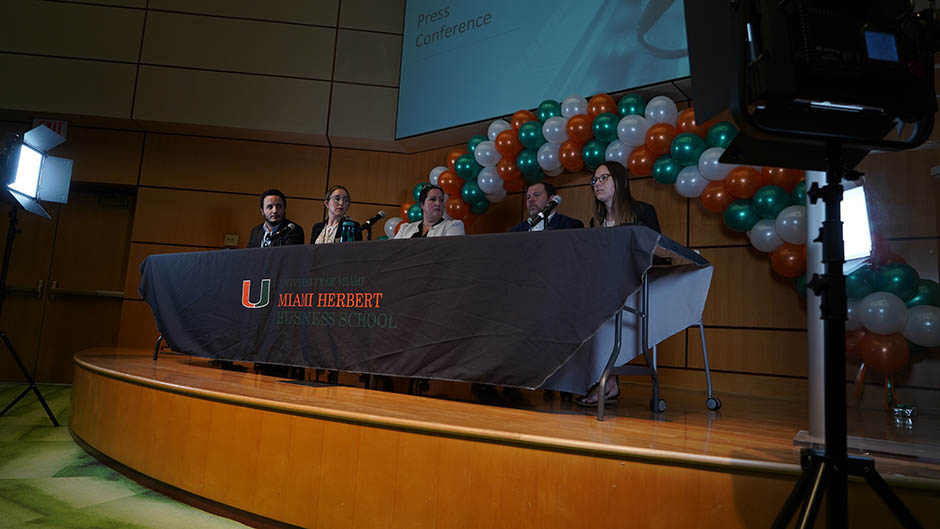From Oct. 21 to 22, within a span of only 24 hours, 75 graduate students experienced a simulated high-stakes crisis environment that tested their aptitudes in organizational governance during the Miami Leadership Challenge 2022. The competition, sponsored by the Johnson A. Edosomwan Leadership Institute at the University of Miami Patti and Allan Herbert Business School, returned to campus after a two-year hiatus due to the COVID-19 pandemic. Corporate executives and members of the press helped create real-life, pressurized scenarios that involved public statements, meetings with the board of directors, and press conferences, demanding students’ ability to respond to turns of events as they developed.
“We pursue experiential learning to give students the opportunity to handle a crisis, but also to receive relevant feedback from senior executives and coaches,” says event coordinator Marina McCarthy, assistant professor of professional practice and director of the sponsoring Leadership Institute. “They get to apply and practice the concepts that we teach them in an academic context in a fast-paced, simulated setting.”
Beginning in the afternoon of the first day, students in teams of five assumed leadership roles of an organization undergoing internal and external turbulence. Separated into designated “situation rooms,” each of the fifteen teams received emails and phone calls from concerned stakeholders and members of the company’s board of directors that required immediate attention, even while pressing events continued to unfold. At the end of the first evening, each team delivered a public statement in a video presentation with the aim of appeasing stakeholder concerns. Though students left the campus at 10 p.m., communication amid the ongoing conflict continued throughout the night.
The next morning, teams faced the task of presenting their crisis strategies to the company’s board of directors. Acting as board members, 18 top-level executives joined the Leadership Challenge from participating companies including Mercer, Amazon Web Services, Imusa USA, Jackson West Medical Center, J.P. Morgan, Florida Blue, Bank of America, Swire Properties, Citrin Cooperman, Baptist Health, LATAM IB, Cyxtera, Girl Scouts of Tropical Florida, Chicago Asset Management Group, Greenberg Traurig, Workiva, and Ryder. These business leaders challenged the teams to evaluate their decisions and address questions regarding liability issues, business continuity prospects, and other main areas under operational threat.
“The role of the board was to engage the students in real dialogue, ask real-life questions, really challenge their thinking and assumptions, and help them find weak spots in their approach,” McCarthy explains. “Again, it is a simulated experience, but one in which students felt that they were really interacting with the board of directors.”
A panel of executives role-playing as board members served as judges for the first round. The final round was judged by Miami Herbert faculty and executives. They evaluated the teams on the quality of their decisions, their public statements, and their performances at the board meetings. Following the meetings, a communications professional coached each group for the final phase of the contest: delivering remarks and answering questions before the press.
“These are really hard 24 hours because students have to learn to think quickly, make sound decisions, and communicate effectively. They are judged on many levels,” McCarthy says.
Only the top three teams moved on to the press conference round. Journalists Riley Kaminer from ClearCritical LLC, Wilkine Brutus from WLRN, Stephen Feller from Healio, and Christiana Lilly, a freelance journalist, asked hard-hitting questions that once again required students to demonstrate poise under pressure.
Final evaluations revealed the contest’s winning team, who received a cash prize of $5,000. The second- and third-place teams received tickets to the ‘Canes Lounge social event during Homecoming weekend and tickets with upgraded seats to the last Hurricanes football game of the season, respectively.
First-place team member Victoria Wellons calls the challenge “such a realistic crisis simulation” and “a phenomenal learning experience.”
“What better way to put what we are learning in the classroom to the test than through a meticulously planned, high-pressure crisis simulation?” emphasizes teammate Christina Sotolongo.
As an essential component of the competition, students received personalized feedback from the corporate leaders, media panel, communications specialist, and judges, signifying valuable advice that they can build on in current or future career settings. Next fall, graduate students who wish to practice their leadership and crisis management skills will have another opportunity to enroll as the intense but rewarding Leadership Challenge resumes its annual schedule.
